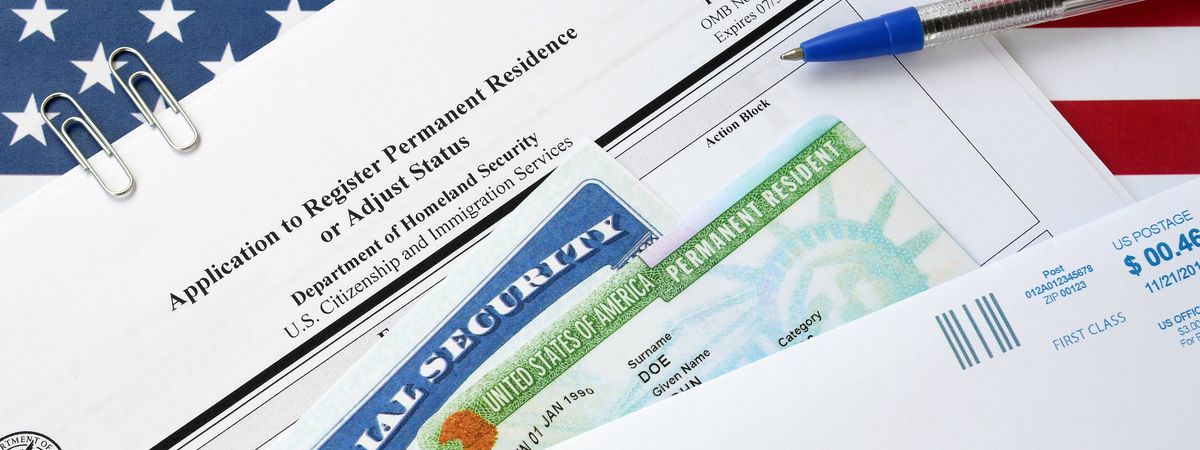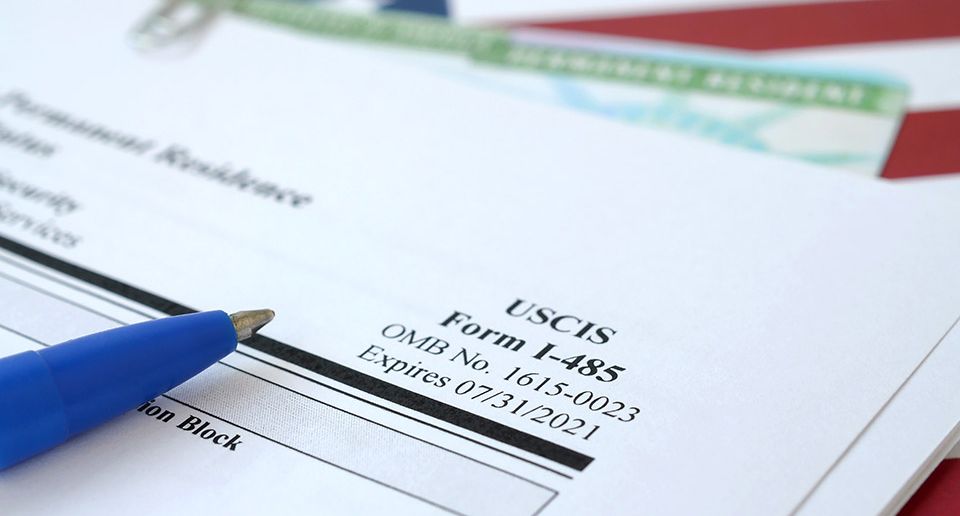El “Nuevo” Formulario I-485, Solicitud de Ajuste de Estatus
Santos Lloyd Team • August 10, 2023
Click here to read this article in English
El Congreso estableció que la solicitud de visa, admisión o ajuste de estatus de un no ciudadano podría ser denegada si se determina que es "probable que en algún momento se convierta en una carga pública".
Según INA 212(a)(4), un solicitante de visa, admisión o ajuste de estatus que probablemente se convierta en una carga pública es inadmisible. El INA no define carga pública. Pero especifica que, como mínimo, se deben considerar ciertos factores al determinar si es probable que un no ciudadano se convierta en una carga pública en un momento determinado.
El 9 de septiembre de 2022, el DHS publicó una regla final que, entre otras disposiciones, define "que probablemente en cualquier momento se convierta en una carga pública" como "que probablemente en cualquier momento dependa principalmente del gobierno para su subsistencia, como lo demuestra el recibo de asistencia pública en efectivo para el mantenimiento de los ingresos o la institucionalización a largo plazo a expensas del gobierno". Finalmente, el 23 de diciembre de 2022, el Departamento de Seguridad Nacional (DHS, por sus siglas en inglés) anunció que el motivo de inadmisibilidad por carga pública entraría en vigencia.
USCIS debe aplicar esta determinación de inadmisibilidad por cargo público a la mayoría de los no ciudadanos que solicitan la residencia permanente legal/Tarjeta verde al adjudicar el Formulario I-485 (Solicitud de ajuste de estatus, también conocido como el formulario que le otorgará una tarjeta verde dentro de los EE. UU.) En consecuencia, a partir del 23 de diciembre de 2022, todos los solicitantes deben usar la nueva versión del Formulario I-485, que incluye una nueva parte de carga pública y varias preguntas adicionales.
Este cambio hará que sea más oneroso para las personas que intentan ajustar su estatus mientras están en los EE. UU., ya que el solicitante deberá proporcionar cuidadosamente la siguiente información:
- Número de personas en el hogar
- Ingreso Anual del Hogar
- Valor total de los bienes del hogar
- Valor total de las obligaciones del hogar
- Grado o nivel escolar más alto completado
- Lista de habilidades relacionadas con el trabajo, certificaciones, licencias, certificados educativos
- Si un solicitante alguna vez ha recibido programas de beneficios en efectivo para el mantenimiento de ingresos
- Si un solicitante ha recibido alguna vez una institucionalización a largo plazo a expensas del gobierno
Estos cambios hacen que sea aún más importante tener un abogado con licencia que trabaje con usted durante todo su proceso de inmigración. Si tiene alguna pregunta, no dude en ponerse en contacto con nuestra oficina.
Este blog no busca constituir una asesoría legal y nada de lo que aquí lea debe interpretarse como el establecimiento de una relación abogado-cliente. Programe una consulta con un abogado de inmigración antes de actuar basado en cualquier información contenida en el presente.
This Facebook widget is no longer supported.
Similar Posts

The answer to this is: it depends! Eligibility criteria for public benefits varies among states. It is always important to check what the state you live in requires for someone to receive public benefits. In the state of California, you might be eligible for public benefits depending on your immigration status. Public benefits may help you cover basic expenses like food, housing, and healthcare.

The answer to this question changed considerably after President Biden rolled back some of former President Trump’s harsh immigration policies. In 2019, Trump had issued an executive order known as “The Public Charge Final Rule,” which caused the receipt of most public assistance programs to negatively impact AOS applications, and with few exceptions (e.g. emergency services and Medicaid recipients who were pregnant or under the age of 21).

In recent weeks, the U.S. government has moved to terminate Temporary Protected Status (TPS) for multiple countries, sparking a wave of last-minute litigation and creating significant uncertainty for beneficiaries. This shift is having a profound impact on those who rely on TPS for lawful presence and work authorization in the United States. Across the country, federal courts have intervened to pause or block scheduled TPS terminations for several countries, including Burma (Myanmar), Ethiopia, Haiti, South Sudan, and Syria. In response to these court orders, USCIS has updated its webpages to indicate that TPS status and related Employment Authorization Documents (EADs) are extended for these populations. However, USCIS is intentionally not providing specific new end dates for EAD validity while the litigation remains in flux. The Department of Homeland Security (DHS) has prominently noted that it "vehemently disagrees" with these court orders and is actively working with the Department of Justice on next steps. This legal landscape remains highly unpredictable and varies drastically depending on the country of origin. For example, on February 9, 2026, the 9th Circuit Court of Appeals granted a stay allowing the government to proceed with the termination of TPS for Nicaragua, Honduras, and Nepal while the underlying legal challenges continue. Because of this ruling, the automatic extension of work authorization for these individuals has ended, and employers are now required to reverify the work authorization of affected employees, who must present alternative valid documentation to continue their employment. These rapid changes and the lack of clear end dates are causing complications beyond the workplace. Because driver's licenses often track the length of an individual's authorized stay, many DMVs are currently declining to issue or renew driver's licenses for impacted TPS populations. For employers, managing internal communications, avoiding onboarding errors, and navigating Form I-9 compliance has become increasingly complex. It is more important than ever to be well-prepared and proactive in monitoring these rapid changes. At Santos Lloyd Law Firm, P.C., our immigration attorneys are ready to guide you through this evolving process and ensure you are informed, and supported. Please contact us if you have questions or need assistance.

U.S. Citizenship and Immigration Services (USCIS) has announced a major change to the H-1B cap selection process. Under a final rule issued on December 29, 2025, USCIS will replace the long-standing random H-1B lottery with a wage-weighted selection system that favors higher-paid and more complex positions. The rule is scheduled to take effect on February 27, 2026 , just ahead of the fiscal year 2027 H-1B cap registration season, unless delayed by legal challenges. If implemented, USCIS is expected to release additional guidance explaining how employers must submit registrations under the revised process. This change marks one of the most significant reforms to the H-1B program in recent years. Up until 2025, all registrations were treated equally once the annual cap was reached. Under the new system, selection odds will be tied to wage levels based on the U.S. Department of Labor’s Occupational Employment and Wage Statistics data. All H-1B registrations will still be placed into a single selection pool, but registrations tied to higher wage levels will receive multiple entries into that pool, increasing their likelihood of selection. Lower wage levels will receive fewer entries, making selection less likely but not impossible. H-1B wage levels are not determined solely by salary. Each wage level reflects the complexity of the job, the level of responsibility involved, and the education and experience required . Entry-level positions involving routine duties and close supervision are generally classified at the lowest wage level, while positions requiring independent judgment, advanced skills, and significant responsibility fall into higher wage levels. The highest wage level is reserved for roles that involve expert knowledge, strategic decision-making, and substantial leadership or technical authority. USCIS is expected to closely scrutinize selected petitions to ensure that the wage level claimed during registration is supported by the job duties and salary offered in the petition. Any discrepancies between the registration and the petition may result in requests for evidence, denials, or enforcement action. With the elimination of the purely random lottery, employers should begin preparing early by carefully evaluating job descriptions, wage levels, and overall H-1B strategy. Accurate classification and thoughtful planning will be essential under this new wage-based selection system. If you are an employer considering H-1B sponsorship, or a foreign professional wondering whether your position may qualify under the new wage-based system, consulting with experienced immigration counsel is more important than ever. Santos Lloyd Law is actively advising clients on H-1B cap registrations and strategy under the new rules. To discuss your options or determine whether you may qualify, contact our office to schedule a consultation.

During the recent administration there has been an increase in issuance of Requests for Evidence for EB-1A petitions for those of Extraordinary Ability. A Request for Evidence is a request that is made by USCIS that should explain how the evidence is deficient in proving the criteria argued and what additional evidence needs to be provided by the applicant to meet the criteria. EB-1A petitions are already normally subject to higher scrutiny because their approval is the first step needed to apply for Lawful Permanent Residence or a green card. USCIS normally requires not just evidence but that the evidence be provided with context and information to show why it matters in a particular field. For example, if you were providing evidence of your membership in an organization that requires outstanding achievements of its members, just providing evidence of the membership is not enough. You must explain what that membership is and provide background information on the organization granting the membership. You also need to provide evidence on the criteria that is used to select the members, information on those who select the members to show that they are recognized experts, other documentation such as articles about the membership organization to show its importance, and any other relevant evidence and background information to show that the criteria is met. A request for evidence being issued prior to the current administration was not uncommon, but in the current climate it is more surprising to not receive a request for evidence for this type of case. It is important to remember that a request for evidence is not a denial. Depending on the validity of the information in the request and the substance some Requests for Evidence can be overcome, and the case be approved. It is important to carefully review the request and note if there are any errors in the content and application of the regulations by USCIS. If you have an attorney, you should work with them and make sure that you provide any evidence you think may be helpful. Although there is a deadline by which a response must be submitted, attention to detail and patience will go a long way when dealing with having to respond to a request for evidence. If you believe you may qualify for this type of visa, please feel free to contact our office.




